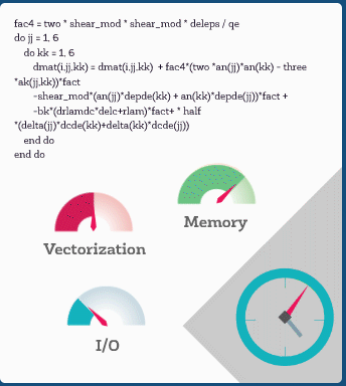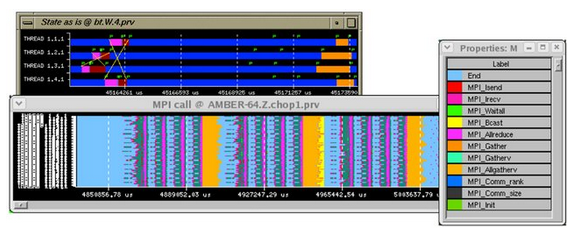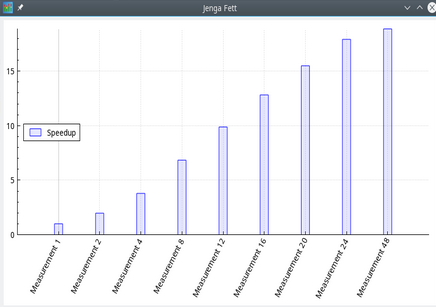Welcome to the 13th newsletter from the EU POP Centre of Excellence. This issue’s focus is on promoting knowledge, best practise and skills in application performance profiling. There are details of two webinars, a hands-on training course and a new feature of the Scalasca profiling tool. For new performance analysis requests, please see the section Apply for free help with Code Optimisation at the bottom of this newsletter.
This issue includes:
- NAG webinar - Tools and Methods for Application Performance Profiling on Thursday December 5, 2019 3pm GMT | 4pm CET;
- POP webinar - Guided Performance Analysis and Optimization using MAQAO on Thursday January 23, 2020 2pm GMT | 3pm CET;
- BSC Performance Analysis and Tools Hands-on Workshop. Barcelona, Spain. March 2 - 3, 2020;
- First glimpse of the Scaling Behaviour Using CubeGUI/Scaling Plugin;
- POP out and about – events that POP have attended recently;
- POP out and about – meet POP members face to face at the following events:
- Advances in Computational Biology Conference. La Pedrera. Barcelona. November 28 - 29, 2019;
- BioFIT, Marseille, France. December 10 - 11, 2019.
- Apply for free help with code optimisation;
- The POP Helpdesk.
For information on our services and past editions of the newsletter see the POP website.
NAG Webinar - Tools and Methods for Application Performance Profiling
Thursday December 5th 2019, 3pm GMT | 4pm CET
This webinar, given by one of the POP partners, may be of interest to many POP users. It will provide an overview of the available methods for profiling HPC applications. Participants will learn about the different analysis approaches and where they should be used. The primary focus will be on the analysis of parallel application performance (MPI and OpenMP) but it will also cover single thread performance (efficient memory use, I/O analysis, etc). Examples will be shown using various profiling tools, although no prior knowledge of these tools will be assumed. Following the webinar, attendees can expect to have an understanding of the available types of profiling tools, and how to choose an appropriate tool to diagnose potential performance issues in their own applications.
This webinar targets programmers who wish to understand how to improve application performance. It is specifically intended for those who are writing applications making use of parallelisation, though the discussions of serial, memory and I/O profiling are of relevance to serial applications also. An understanding of HPC architecture and programming paradigms will be useful but is not essential.
Click on this link for registration.
POP Webinar - Guided Performance Analysis and Optimization using MAQAO
Thursday January 23rd 2020, 2pm GMT | 3pm CET
 MAQAO (Modular Assembly Quality Analyzer and Optimizer) is a performance analysis and optimization framework operating on binary files with a focus on core performance. Its main goal is to guide application developers along the optimization process through synthetic reports and hints.
MAQAO (Modular Assembly Quality Analyzer and Optimizer) is a performance analysis and optimization framework operating on binary files with a focus on core performance. Its main goal is to guide application developers along the optimization process through synthetic reports and hints.
In this 30 minute webinar, we will present the different components of MAQAO and how the tool performs multiple analyses which are later aggregated into graphical performance views and suggestions on the compilation process or the implementation. We will also present how MAQAO predictions of the speed-up to be gained from the suggested optimizations can help developers understand an application's behaviour on a target processor architecture.
Click on this link for registration.
BSC Performance Analysis and Tools Hands-on Workshop
Barcelona BSC Campus Nord
March 2nd – 3rd 2020
The objective of this course is to learn how the Paraver and Dimemas tools can be used to analyse the performance of parallel applications and to gain familiarity with the use of the tools and with instrumenting applications with Extrae. Attendees will acquire a basic knowledge of the use of the BSC performance tools. They will then be able to apply the same methodology to their own applications, identifying potential bottlenecks and getting hints on how to improve application performance.

Click here for registration.
First Glimpse of the Scaling Behaviour Using CubeGUI/Scaling Plugin
Rarely is the performance of an application at some fixed configuration the only point of interest. Most of the time, the user also would like to know how their application behaves if more resources are added, e.g. using more processes and/or threads. For a more sophisticated modelling of the performance behaviour a tool like Extra-P should be used. However, in many cases, just getting an idea of the scaling behaviour without a comprehensive study would suffice.

In the usual scenario, the user would like to know what to expect if they scale up the number of processes/threads. The CubeGUI Plugin “Scaling” serves this purpose. The POP Tool Time blog article "A first glimpse of the scaling behaviour using CubeGUI/Scaling plugin" describes the details.
POP out and about – events that POP have attended recently
Conferences
The Supercomputing 2019 conference and associated exhibition continues to attract increasing numbers of exhibitors and attendees - just shy of 14,000 this year - from all over the world, and POP was represented in force. Some of the POP partners were at HPC’s premier conference. Click here to read the blog.
POP participated in the Research Agora at this international event for Computer Aided Engineering in Vicenza, Italy, 28-29th October 2019. Click here to read the blog.
Training Events
Another remit of POP is to participate in training events as they are very good opportunities to share our expertise and to present the POP methodology to the attendees. In the training activities, the attendees are encouraged to bring their own codes, so after some introduction of the tools we organise hands-on sessions where they can learn about the tools by analysing a code they are familiar with and that they want to run more efficiently.
We try to collaborate with other Centres of Excellence (CoE) or EU projects on the training activities. POP participated in two events organised by EoCoE-II Center of Excellence, the ANF Evaluation of HPC scientific application (Observatoire de Haute Provence - France, 16-20 Sept) and the EoCoE-II Performance Evaluation Workshop (University of Erlangen - Germany, 7-10 October). In November, POP contributed in the second MareNostrum Hackathon, MNHACK19 (Barcelona Supercomputing Center - Spain, 4-6 November) organised by the EPEEC EU project. Each of these events had around 12-20 attendees interested in learning about the tools and optimising their codes. Click here to read the blog.
POP also recently attended Dassault Systems BIOVIA at their Cambridge site to provide training in performance analysis of parallel applications. Click here for further information.
If you would like to attend one of the POP training events, please subscribe to our newsletter at the POP Web site and we will keep you informed about the opportunities.
For all details of events that POP have attended, please see our blog page.
POP out and about – meet POP members face to face at the following events
POP will be attending the following events. If you would like to meet a member of the POP team, please email pop-helpdesk@bsc.es and we will happily arrange a meeting with you.
Advances in Computational Biology Conference 2019
POP member, Marta Garcia, will be presenting at the Advances in Computational Biology Conference 2019. In this talk, she will show the performance analysis of a multi-physics parallel code Alya running on the MareNostrum4 Tier-0 supercomputer. In particular, she will analyse a biological use case consisting of simulating the flow of blood within a human heart. With the help of the visual performance analyser Paraver, she will show different factors that can affect the parallel performance in these types of simulations. While some of the contributions are technical, she will try to keep the explanation understandable and relevant for a diverse audience.
The goal of this talk is to review the challenges of efficiently running complex parallel biological simulation codes on a parallel high-performance computing system and highlight that an interdisciplinary approach is crucial for success. She will emphasize the relevance of performance analysis to help identify sources of inefficiency in parallel codes and explain how the POP service can help code developers improve the performance of their parallel codes.
For more information on the conference, please click here.
BioFIT 2019
POP have partnered with FocusCoE to attend BioFIT 2019, along with our fellow Horizon 2020 CoE CompBioMed. BioFIT is a partnering event designed to build academic and industrial collaborations and knowledge transfer partnerships in the life sciences. We will have a booth at the conference and will be available to demonstrate the POP tools and discuss what POP can do for you and your code.
For more information on the conference, please click here.
If you feel that POP should be attending an event that you think is relevant, please contact us at pop-helpdesk@bsc.es - suggestions are most welcome!
Apply for free help with code optimisation
We offer a range of free services designed to help EU organisations improve the performance of parallel software. If you are not getting the performance you need from parallel software or would like to review the performance of a parallel code, please apply for help via the short Service Request Form, or email us to discuss the service further and how it can be beneficial.
These services are funded by the European Union Horizon 2020 research and innovation programme so there is no direct cost to our users.
The POP Helpdesk
Past and present POP users are eligible to use our email helpdesk. Please contact our team of experts for help analysing code changes, to discuss your next steps, and to ask questions about your parallel performance optimisation.

